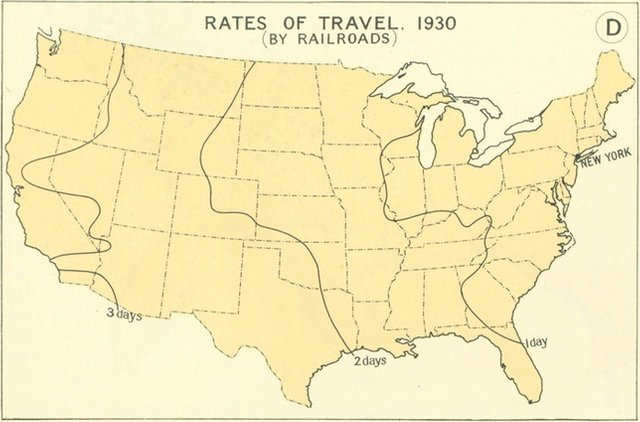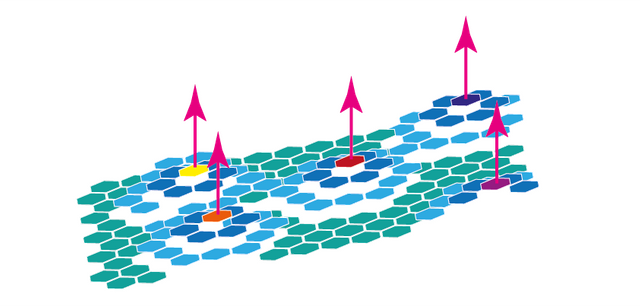Innovation and the future: It is all about transport
When I stand in front of clients, I often have a whiteboard to support my conversation, it makes explaining stuff much easier and because I am a 'bit of a talker', I can cover a lot of ground very fast. I do a lot of work with innovators of different sorts for various capacities and one area I cover is the speed of innovation. Well, the philosophy of it anyway.
The speed of innovation is increasing in a type of 'Moore's Law' pattern, the law where the number of transistors in a dense integrated circuit doubles approximately every two years. At some point, this won't hold but the technology behind the chipsets will change from silicon to something else too as will the software to manage the efficiency of a chip.
But, does this hold true for innovation and how does transport have anything to do with it? Glad you asked and I don't know but let's have a little look at some old maps. I found these from an article while I searched for some supporting images.




As you can see, the time it took to travel across the US from 1800 to 1930 changed massively. Between 1800-1830 it halved. Between 1830-1860 it halved. 1860-1930 it is 3 times faster and well now, we fly. The reason for the speeding up of travel was of course technology. Train tech in particular. Before this, horse and cart took who knows how long but, it was faster than walking.
Moore's law doesn't need to hold precisely true to be useful as an aid to understand what is happening here or for the analogy to help understanding. If we use transport as metaphor for information flow, we can see how innovation speeds up over time.
Communication is the transport of one idea from one point to another. Something like the wheel where the earliest remains are from some 6000 years ago found in Mesopotamia, were also invented in other places, hundreds, if not thousands of years apart. Why the big gaps, lack of communication. If you haven't noticed, the speed of communication is increasing also. Not just because of emojis.
If someone invented the wheel today, how long would it take before a knockoff is rolling of a production line in China? This is possible because the transport of ideas is nearing instantaneous (in terms of history).
There is also another factor that drives innovation, capitalism and consumerism. We all want to have more and more, cheaper and cheaper. Every company wants to increase their profits too which means competition and now, that competition is supported by ever faster information flows and decreasing product life cycles.
If a company wants to increase their profits by say, 10 percent a year, how long until they have doubled their profits? Can't you do it in your head? Sure you can, at least to a close enough approximation. Heard of the law of 72?
The rule says that to work out the years it takes to double, the interest rate can be divided into the number 72. For example, 10% growth on a million dollars would mean a doubling 72/10 = 7.2 years (actual number is 7.27 years). What this means is that a company wanting 10 percent returns per year with a starting point of 1 million this year, will need to make 2 million in 7.2 years. If they want to continue? 4 million in another 7.2 and 8 million in another 7.2 years. That means that a company with a yearly earning of 1 million now will need to be making 8 million in about 22 years time.
What are the chances of this happening and what has this got to do with innovation?
If we look at transport again, we go from feet, to horse, to horse and cart, to boats, trains, cars, planes, jets, rockets, satellites, shuttles, deep space probes... What is next? Star Trek transporters, Instantaneous astral projection to other planets? Who knows. But, each innovation has a decreasing time frame between instances.
We see the same thing in communication speed from word of mouth all the way up to the instant messaging of 'K' to a complex question regarding plans for the weekend.
But, it is not sustainable, at least in most things. The innovation process cannot last as with each large, world changing innovation, it essentially halves the time until the next one is required to keep the system going. Perhaps in recent history we can look at personal computing, the internet, mobile computing, blockchain? Roughly, mainstream personal computing started in the 70s, the internet in the 90s, mobile computing 2000, blockchain 2008.. What is next or, has it already been invented?
Of course, innovation and the fields it occupies are very diverse and they feed off each other to some extent but, they are destined to keep increasing because the rate of communication between each point is speeding up. It sets up compounding effects against each other for example with Crispr, the gene editing tool. It's speed of innovation is massively aided by the ability for a large group of genetic scientists and tool makers to share their findings and cooperate globally. If this was 1800 and someone discovered the concept, how fast would it spread?

What does this mean? Hard to say but, at the rate it is going, the modeling for all things of the past become increasingly irrelevant, including financial modeling. So far, none of the traditional models have really factored in cryptocurrencies, nor the speed of potential spread. They haven't really thought about what happens when such large chunks of value cross borders instantaneously nor what it means for taxes, investments, profits.
but, this is the problem with all things these days, it is a chase where those chasing are going to fall behind at twice the rate. At least, technologically.
My father is over 80, my grandfather would be 116. Imagine teaching my grandfather in 1990 to set the microwave clock. Imagine teaching my dad about how blockchains operate. Imagine teaching my Grandfather about how blockchains operate.
This is a problem with education, it is a transport of ideas from the past but, it isn't speeding up the content at the same rate the content is changing and, it still isn't teaching people to think, discover, learn, direct and continually develop themselves. It teaches what is under the assumption that it is not going to change so much.
So far in my nearing 40 years, I have seen personal computing, the internet, mobile computing, blockchain, I have seen private companies enter the space race, global trends sweep the world in minutes and a whole range of changes in society but, one thing has remained constant. Humans keep pushing for more.

What does this mean? Well, in my daughter's lifetime, she is likely going to experience twice the rate of disruptive technologies I have experienced in mine. Me preparing her for anything less is going to likely do her a disservice and limit her potential.
But, what we have known in the past, the capitalist nature of humanity and the competition inherent in it, the rate of growth required is incapable to maintain by the current system. The entire process will need to be revolutionised to factor in all that has not yet been invented. Do you know what this means?
What you know and think about today, is going to have to change. How painful this shift will be is up to each of us. But, there are going to be a lot of people who are going to fight tooth and nail for it to remain as is, hold the status quo. You might not think yourself among them, are you sure?
How do I see the future? Either in complete destruction or a complete shift in how humanity organises itself and interacts with each other, finances projects, consumes, supports and dreams. Using the current models of the past will likely lead to a dystopian nightmare rather than dreams of hope fulfilled. I really hope that we can do better than that.
Who knows how we may get there, who knows how fast, who knows where we may travel together?
Taraz
[ a Steemit original ]
Interesting article. I've just been discussing this with a friend today. It's clear that our current accelerating pace of technological change is unsustainable. At some point it will encounter a limitation, whether that is in the form of a super intelligent A.I. wiping us all out or (hopefully) something less dramatic.
I believe we are somewhere on the exponential portion of an S curve, which means at some point the rate of change is likely to level off, or at least dramatically decrease. What I am not sure about is, are we at the beginning, middle, or near the end of the exponential part of the curve?
We're on the cusp of a lot of big changes right now. I'm curious, excited, and a little bit worried, to see where all of this takes us.
I wouldn't bet on the rate of technological change slowing down, anyway, because explosive growth in AI has just begun.
That's a good point, because AI in turn will likely help to increase the pace of technological change even further, because it will not have the same limitations that we do. Crazy to think of what sort of innovations are coming next. I guess that it's very possible we are still near the start of the exponential part of the curve!
Absolutely.
100 years from now we can reach mars in a day at this speed
One thing i have noticed about technology and all innovations at large, is that am going to miss a lot of it. I think i was born too early. can you imagine someone who was born in early nineties, he won't live long enough to witness the breakthrough of technology in the world. Same is going to happen to us, but nothing we can do, we just need to embrace the current level of innovations we have and maybe add some to our capability.
Thanks for pointing that up, education system just drives me nuts.
Yes, but we are lso going to be drivers for a lot of it too.
That's right, let's innovate for the next generations to build
To those who have difficulty in adjusting to the new advancements and disruptions happening around us... I would say that's the cost of ignorance you have to pay for being blind and not giving attention to what's happening around the surrounding. In pre-historic times, this would mean death... Life's too easy for us at the present!
Nevertheless, we are adaptive species and I think there's no reason to be alarmed of :)
Most of us :)
Nice article, i believe that technologies will continue to progress and very soon we will be able to travel big distances really fast. I recommend to google '' venus '' project, there is a part where venus project creators talks about importance to find best way to transport products, i think it will be interesting to you:) Thanks for sharing
I don't think that we learn the things we should, the education system is pretty much a two dimensional flavorless basic package, I think that we all need something different than just that.
When I look at what people made of it all, we are processed, and not 'made' or 'thought'.
I agree. Things will change but hopefully, fast enough.
wow great grapichs work and your artical also amazing writing really unbliveable thanks for shere this amazing photo
The next questions is, what push of transport innovations? What the real motive behind those?
very useful article. Excellent.